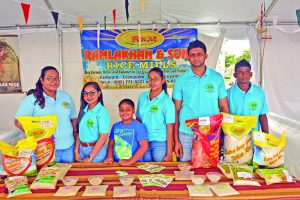
Going into its fourth year since the event was launched, the much anticipated Farmers Market Day organised and hosted by the Agriculture Ministry, through the New Guyana Marketing Corporation (GMC) is set to commence on June 1, with its main goal of promoting products and produce of local farmers and agro-processors.
Farmers from various regions across the country are expected to flock D’Urban Park, Homestretch Avenue, Georgetown to display the variety and quality of their products with the purpose of widening their market supply.
Some of the expected products range from fruits drinks, cooking sauces, oils and various rice varieties to the showcasing of plants, handmade craft and locally designed ornaments.
General Manager of GMC, Ida Sealey-Adams, had noted that the role of the Marketing Corporation is to develop the non-traditional agricultural sector and to expand all production sectors locally, regionally and internationally.
The event which was first held in 2017, directly after the country celebrated its 51st Independence anniversary, it was made a reality through a collaboration between the Agriculture Ministry and the Business Ministry.
Only recently, the Public Telecommunications Ministry in an effort to introduce modern technology into the agriculture sector had commenced training for persons in the said field to successfully utilise the Agricultural Commodities Trading Exchange app which is expected to bring together producers, sellers and buyers of vegetables, fruits and other agricultural products anywhere in the world, into a single online marketplace.
Business Analyst Tamika Inglis said by the time MoPT launches the National Agriculture Strategy later this year, most frontline operators in agriculture will be familiar with the app and farmers will be using it to market their produce.
This new technology is recognised as a solution to the decades-old marketing problems faced by hinterland and remote farmers who lose revenue from spoilage.
Discover more from Guyana Times
Subscribe to get the latest posts sent to your email.











